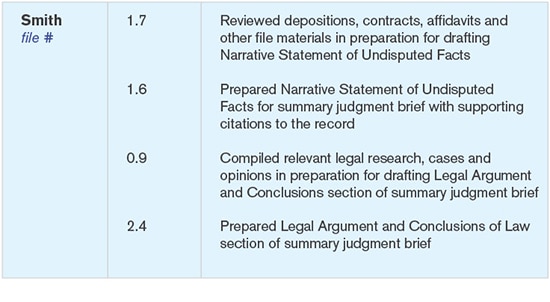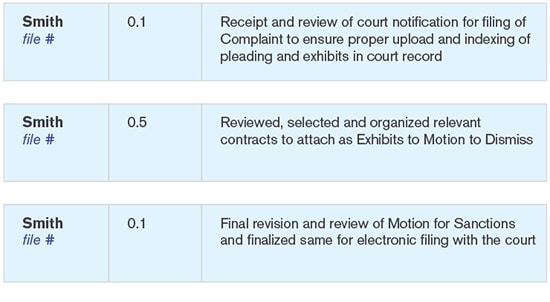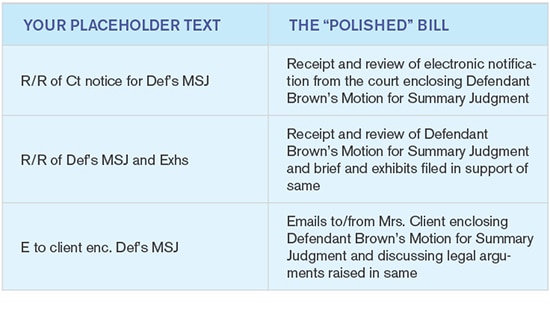Annie Dike, author of “The Billable Hour: A Legal Practitioner’s Guide,” has three specific tips to help you capture more time and billing.

Billing. It’s not something we like to talk about, but it is something lawyers have to do regularly, so it deserves some attention. Making sure you capture all of your billable time and produce clear, coherent invoices for it helps ensure you get paid the fees you have earned. Here are three tips to help sharpen your billing pencil and even get more billable work out of your day.
1. Break it Out
Don’t bill in blocks, bill in bites — small, bite-size pieces that detail all of the hard work you put into your pleadings and the like. Take a motion for summary judgment, for example. Lengthy, comprehensive briefs for judgment on the pleadings take a lot of time to research and write. Many lawyers will bill that time in one block, like this:

Instead, break up your time into separately identifiable phases of your brief writing, like this:

2. Don’t Let Billable Tasks Slip Through the Cracks
You’re doing the work. Make sure you’re capturing all of it in the form of itemized tasks on your timesheet. Here are a few tasks you’ve probably performed but may have forgotten to bill.
- You review e-notices from the court, even for your own filings, to ensure the pleadings you file are properly uploaded and indexed in the court’s record.
- You review and select exhibits you attach to your pleadings that support your legal argument and further the goal of your clients to obtain resolution in their favor.
- Before filing with the court, you look over pleadings one last time to check for errors, proper exhibit references, and the correct names and designations on the certificate of service, to ensure the pleading is accurate and ready for filing.
Be sure to capture and properly document the time you spend on these critical tasks, like this:

3. Keep Time Contemporaneously
When do you usually enter a billable task in a timesheet? When you start it? When you complete it? At the end of the day? The end of the week? Learn to do it contemporaneously — it’s your duty as an attorney and it will save time in the long run. Train yourself to jot down each billable task as you start it. This will make sure you are keeping contemporaneous records. You can use “placeholders,” initially, to preserve the task, and then fill in the details and time you spent on the task, or “polish” the descriptions, later. Once you implement the system and your placeholder entries become uniform and routine, you can train your paralegal or assistant to polish your timesheets for you, saving you more time to perform more billable tasks.

Annie J. Dike is a former trial lawyer who practiced primarily in the areas of medical malpractice and insurance defense. She is now a full-time consultant and author of “The Billable Hour: A Legal Practitioner’s Guide to Smarter Billing.” Get more tips from Annie at her website, billbetter.net, and via Twitter @billbetter_net.
Catch up on this week’s posts — just click here.















